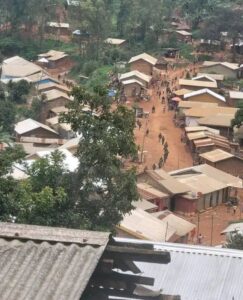The city of Uvira, a jewel of South Kivu on the shores of Lake Tanganyika, has entered a historic turning point. The Alliance Fleuve Congo (AFC/M23), under the political leadership of Corneille Nangaa, has asserted full strategic control over the city, encircling it by land and leaving only the lake passage as the last remaining outlet.
Reports from within Uvira indicate that the city is completely surrounded. Military convoys of government forces have been cut off, and traditional supply lines dismantled. The only possible escape for civilians and state operatives lies across the waters of Lake Tanganyika.
Yet, contrary to narratives of panic, sources confirm that the presence of AFC/M23 has been marked by discipline and calculated precision. The movement’s fighters have established checkpoints and command posts, presenting themselves not as invaders but as strategic liberators determined to end years of insecurity, corruption, and state abandonment in the region.
Uvira’ s fall is not just another territorial advance, it is a geopolitical earthquake in the Great Lakes region. The city is a critical trade and security hub, linking Bukavu, Bujumbura, and the lake transport routes into Tanzania and Zambia. By taking Uvira, AFC/M23 has redefined the military map of eastern Congo and forced Kinshasa to reckon with a reality it has long ignored: that its authority in the east is collapsing under its own weight.
Corneille Nangaa, the political architect of the AFC project, has been clear in his vision. In multiple declarations, he has accused Kinshasa of decades of betrayal, pointing to rampant corruption, exclusion of communities, and the militarization of politics. For Nangaa, Avira’s capture is more than a victory of arms, it is a statement of intent: the Congolese people in the east will no longer be marginalized.
From their positions, commanders of AFC/M23 have underlined three objectives:
- Cutting off enemy supply lines to weaken government resistance.
- Consolidating governance in liberated territories, promising security and administrative order.
- Forcing a national dialogue, one that recognizes the failures of the current regime and creates space for a new political order.
This resonates with many in Uvira, where mistrust toward Kinshasa runs deep. Years of promises without delivery have left residents skeptical of state institutions but cautiously hopeful that a new political force might restore stability.
The encirclement of Uvira signals that the conflict in Congo has entered a new phase. It is no longer limited to skirmishes in remote hills, it is now about the control of major cities and trade routes, and about political legitimacy in a country where the government has long failed to secure its citizens.
By holding Uvira, AFC/M23 has proven its ability not only to challenge Kinshasa militarily but also to offer an alternative political project. Whether the international community acknowledges it or not, the reality on the ground is that M23 is reshaping the future of Congo, one city at a time.
As night falls over Uvira, the symbolism is undeniable: the old order is collapsing, and a new force is rising from the east, disciplined, determined, and led by Corneille Nangaa under the banner of the Alliance Fleuve Congo.




